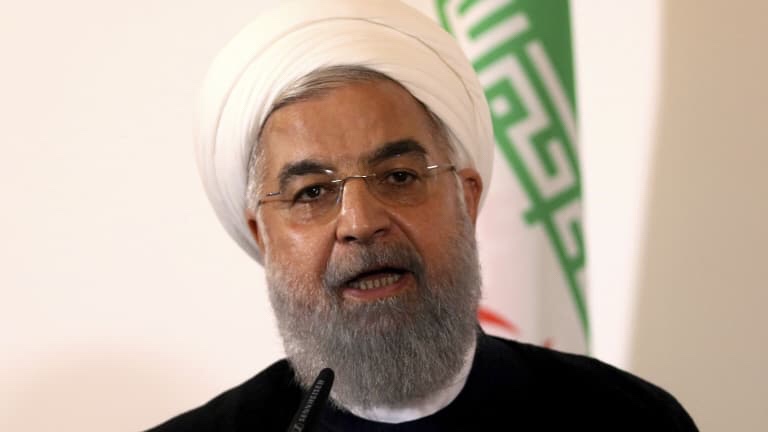 Trump stance on Iran heralds new reality for Australia
Trump stance on Iran heralds new reality for Australia13 August 2018 — 12:00am
The Trump administration is reimposing a series of sanctions on Iran, targeting Iranian trade in aircraft, automobiles, pistachios and gold. In November, an additional round of sanctions will target exports.
These trade moves follow Donald Trump's withdrawal in May of the United States from the Joint Comprehensive Plan of Action nuclear deal. This new reality means that Australia should urgently clarify its stance towards Iran.
We know that Foreign Minister Julie Bishop and US Secretary of State Mike Pompeo discussed Iran at the July AUSMIN summit. While Bishop, commendably and appropriately, has been recently criticising Iran’s regional military aggression and ongoing missile development, Australian diplomats are actively reaching out to Tehran’s commercial class, with the embassy there recently announcing “Australian companies are keen on doing business with Iran” and signalling a “wait and see” approach to the discredited nuclear deal.
Australia needs a clear and consistent position which should be based on Australia’s national interest in robustly addressing the threat posed by a belligerent, expansionist and irresponsible Iran.
Smuggled intelligence documents revealed by Israel have shown both that Iran’s nuclear program was further advanced than anyone thought and that, since the signing of the 2015 agreement, Iran has continued to conceal its nuclear capabilities and ambitions.
This means that Iran has not, as often claimed, complied with the terms of the nuclear deal, reached between Iran, the US, Britain, France, Russia, China and Germany. That deal required Iran to co-operate with the International Atomic Energy Agency to account for and document its past nuclear efforts, but the smuggled archive shows Iran has done the opposite, actively hiding them from inspectors.

Julie Bishop, Australia's foreign minister, left, and Mike Pompeo, US secretary of state, stand for photographs during a bilateral meeting at the Australia-US Ministerial (AUSMIN) consultations at Stanford University.
Photo: Bloomberg
The agreement not only failed to do more than temporarily postpone a nuclear Iran but has effectively empowered Iran to step up its other menacing activities.
Much to the disgust of long-suffering Iranians, funds released under that deal were used primarily to save the despotic Syrian leader Bashar al-Assad and to aid the rebels in the murderous war in Yemen, to fund and direct terrorists and to destablise most of Iran’s other neighbours - all developments definitely not in Australia’s national interest.
Furthermore, Iran’s ballistic missile program is continuing - in contravention of United Nations resolutions.
Meanwhile, even before US sanctions were restored, the economic pressure on the Iranian regime has been intensifying rapidly. Iran’s rial is in free fall, inflation is estimated at 220 per cent, multinational investors are fleeing in droves and street protests against the dire economic situation have become increasingly frequent and nationally widespread.

Iranian President Hassan Rouhani.
Photo: AP
Some oppose outside pressure on the regime, claiming it only weakens “moderate” actors in Iran, such as President Hassan Rouhani, and strengthens hardliners, such as the Revolutionary Guard Corps.
Such claims rest on a fundamental misreading of Iranian politics. Rouhani is no moderate. He has been intimately tied to Iran’s nuclear program for two decades and boasted in 2015 about using negotiations as cover to advance Iran’s nuclear efforts. He also lacks direct control over foreign or defence policy – which is determined by hardline Supreme Leader Ayatollah Ali Khamenei.
Iran signed the nuclear deal because Khamenei decided it was in Iran’s interests, to ease external economic pressure, and because the Obama administration, desperate for a deal, made concessions which essentially allowed Iran to build nuclear weapons after 2025.
Renewed pressure on Iran is the key to both changing these unacceptable arrangements on the nuclear issue and to making new agreements to address the Iranian regime’s other rogue activities.
Thus the Australian government’s more critical stance of late must be backed up by our diplomats. Iran poses a serious threat for our allies and for international and regional order and Australia has a useful role to play in supporting Washington's initiative to deter, counter and contain that threat.
Dr Colin Rubenstein is executive director of the Australia/Israel & Jewish Affairs Council. Previously, he taught Middle East politics at Monash University.
No comments:
Post a Comment